Key takeaways:
- End-of-life conversations require sensitivity, listening, and emotional connection, as individual priorities vary greatly.
- Hospital ministry provides vital spiritual support, benefiting not only patients but also families and caregivers during difficult times.
- Faith can play a significant role in healing, promoting resilience and inner peace during terminal illness.
- Effective communication techniques, such as active listening and validating emotions, transform challenging conversations into meaningful exchanges.

Understanding end-of-life conversations
Understanding end-of-life conversations can be a profoundly challenging experience. I recall a time when I sat with a family who was grappling with the news of their loved one’s terminal condition. There was a heavy silence at first, filled with unspoken fears. How do you find the right words in such moments? It requires sensitivity and a willingness to listen deeply to their concerns and feelings, which can often be the most important part of the conversation.
As I navigated those discussions, I realized that people often want more than just practical plans; they desire emotional connection and validation. Sharing personal stories from my experiences helped to create a space where feelings of loss and hope could coexist. Have you ever noticed how a simple story can bring comfort? It was in those moments, sharing laughter and tears, that we found a common ground that made the conversation easier.
Understanding end-of-life conversations also means recognizing that no two are alike. Each person brings their unique fears and hopes to the table. For instance, in another visit, a patient was more concerned about leaving a legacy than discussing medical options. Isn’t it fascinating how individuals prioritize different aspects of their journey? Tailoring the conversation to their individual needs can transform how they view this stage of life.
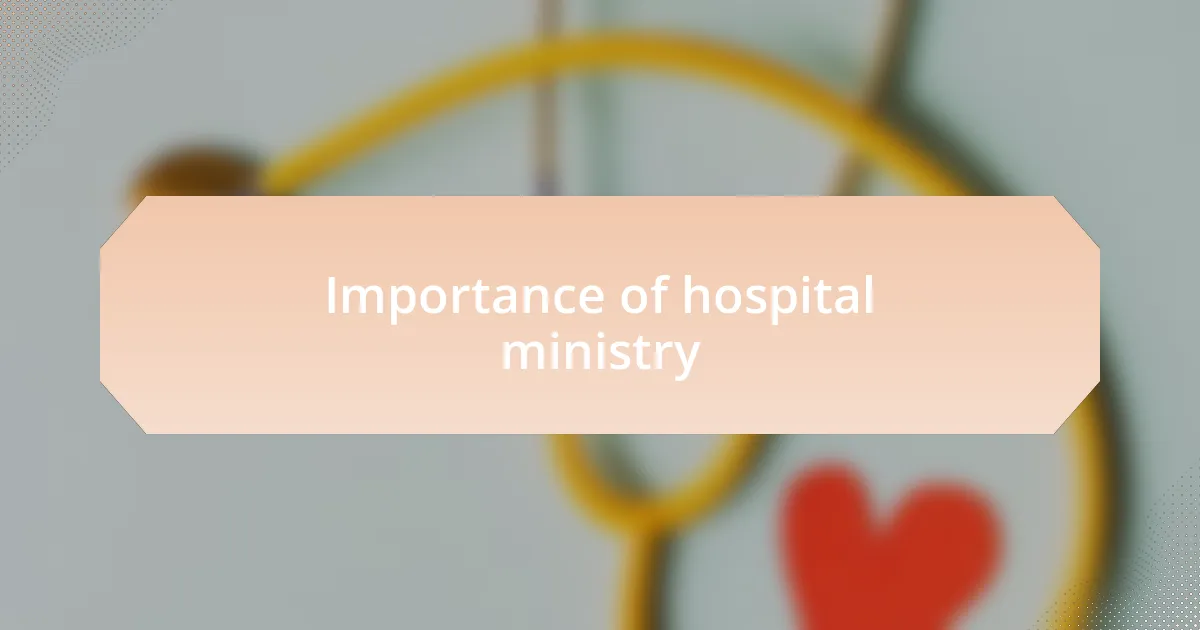
Importance of hospital ministry
Hospital ministry plays a vital role in providing spiritual care and emotional support during difficult times. I remember a hospital visit where a chaplain’s presence made an overwhelming atmosphere feel just a little bit lighter. They didn’t have to say much; instead, they sat quietly beside a grieving family, allowing them to share their fears and hopes. Have you ever felt the peace that comes simply from knowing someone is there for you?
In my experience, hospital ministry serves as a bridge between clinical care and emotional well-being. For instance, when a patient expressed fear of the unknown, the minister was able to offer comforting words that resonated deeply with that individual’s beliefs. Moments like these highlight how spiritual support can foster resilience, giving patients and families the strength they need to navigate their challenges. Isn’t it uplifting to think that faith or spiritual conversations can help alleviate some burdens?
Moreover, the importance of hospital ministry extends beyond the patients to the families and staff. I’ve witnessed how caregivers find solace in chaplain visits, allowing them to process their own emotions amidst the chaos. When the demands of medical care become too heavy, having someone to turn to for comfort can make all the difference. Isn’t it fascinating how this support system can rejuvenate the spirit of everyone involved?
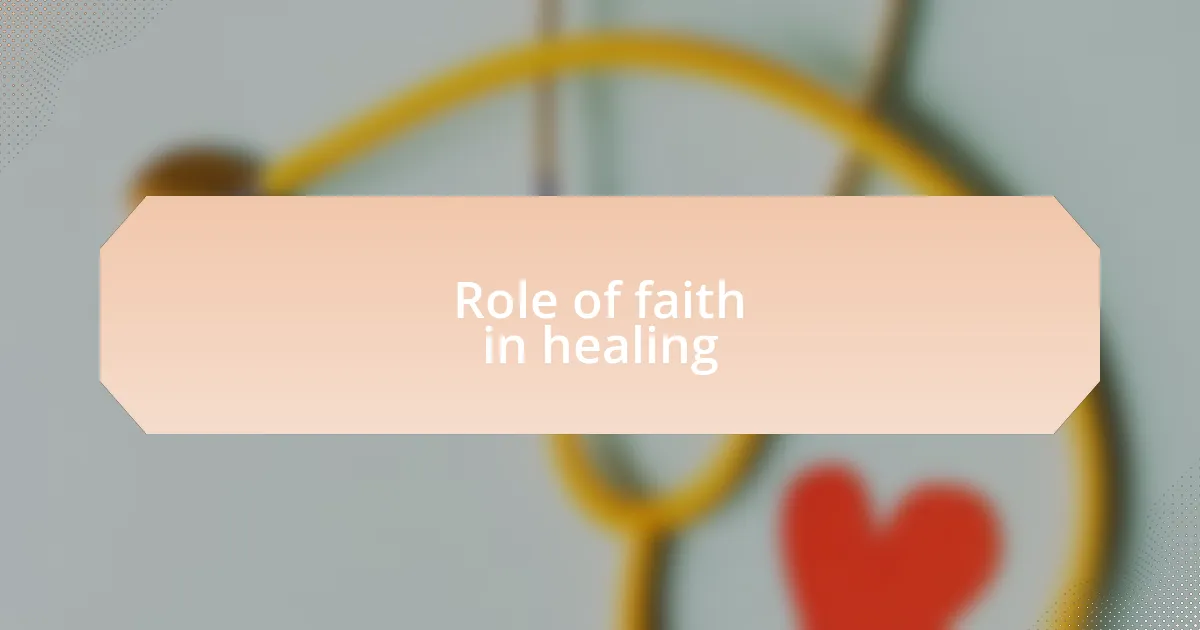
Role of faith in healing
True healing often goes beyond physical ailments; it taps into our spiritual core. I recall a patient who, despite battling a terminal illness, found renewed strength in prayer. Each time a loved one held their hand and recited comforting verses, I could see the tension ease and a flicker of hope shine in their eyes. Have you ever witnessed how faith can transform fear into acceptance?
In my interactions, I’ve learned that faith often acts as a balm for the soul. One day, a family member confided in me that they were struggling to cope with a loved one’s diagnosis. Through sharing their beliefs and finding solace in scripture, they experienced a profound sense of calm. Isn’t it remarkable how these spiritual connections can carve a path to inner peace, even in the hardest moments?
Furthermore, the collective faith of a community can create a powerful healing environment. In one instance, a hospital organized a prayer circle for patients and their families. The atmosphere buzzed with palpable energy as participants shared stories of hope and resilience. Isn’t it amazing how connection through faith can uplift spirits and foster a deeper sense of belonging during such vulnerable times?
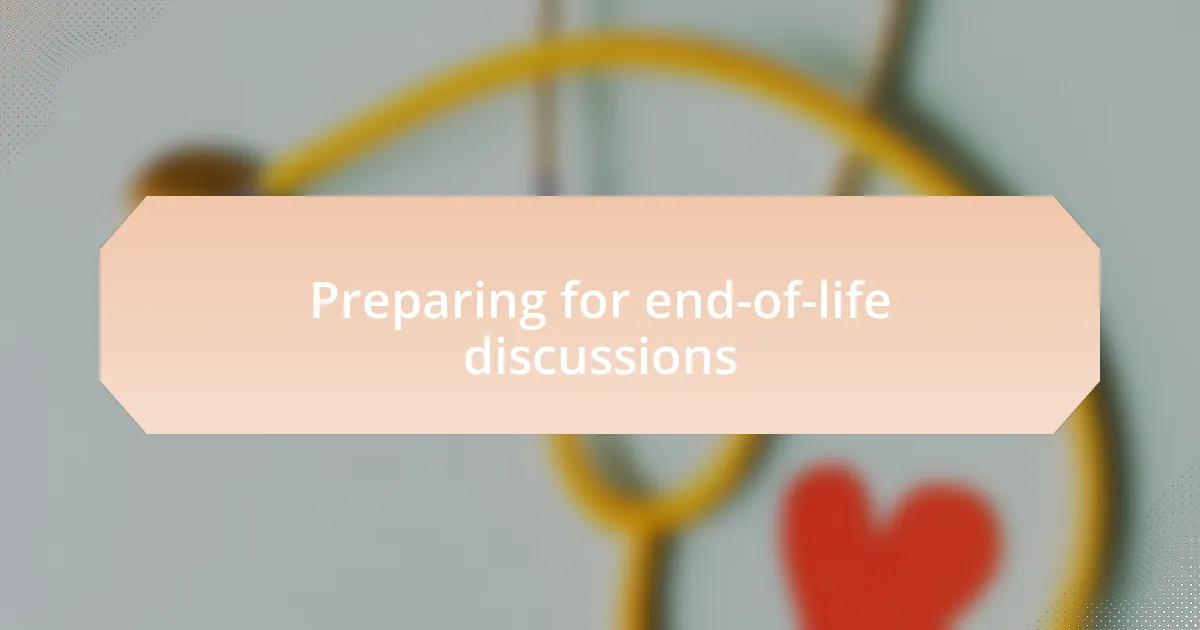
Preparing for end-of-life discussions
When preparing for end-of-life discussions, it’s essential to approach the topic with sensitivity and compassion. I remember a moment when I guided a family through this intrepid conversation. They had hesitated for so long, fearing the pain it might bring. Yet, as we began to share stories, the atmosphere shifted; honesty unlocked an emotional space where they could express their fears and hopes without judgment. Have you ever felt that lifting of weight when you finally confront something you’ve been avoiding?
In my experience, it helps to create a comfortable environment for these discussions. A simple act, like gathering in a familiar room or sharing a meal beforehand, can set a positive tone. I once facilitated a conversation where a patient and their family shared laughter amidst tears, recounting fond memories. This blend of emotions made it easier to talk about difficult decisions, reinforcing that love and connection remain at the center of these conversations. How do your surroundings influence your comfort in sharing your feelings?
Moreover, being prepared with open-ended questions can guide the dialogue naturally. I often start by asking patients what brings them peace and what they envision for their final days. This approach invites reflections rather than directives. In one memorable session, a patient expressed a desire to share their favorite books with family during their last days. This simple wish sparked a series of heartfelt conversations that made everyone, including myself, reflect on the legacies we leave behind. What would your answer be if someone asked you about your wishes?
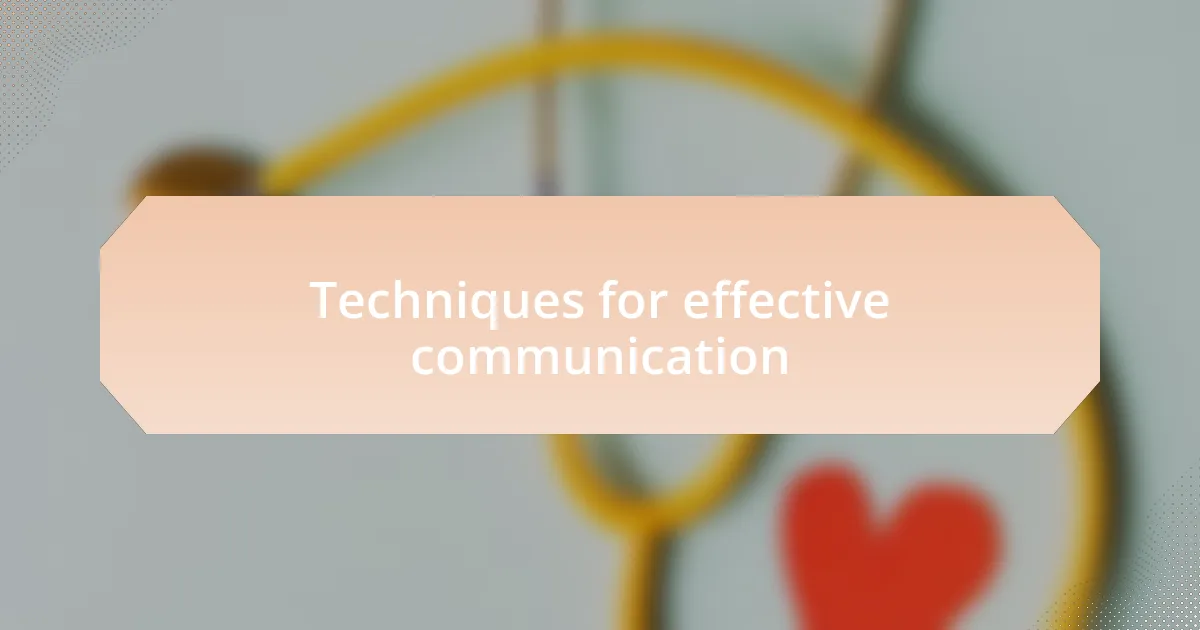
Techniques for effective communication
Effective communication in end-of-life conversations hinges significantly on active listening. I once sat with a patient whose family appeared distracted and anxious. By maintaining eye contact and nodding affirmatively, I signaled my genuine interest. This small gesture encouraged them to share their concerns openly, transforming a tense atmosphere into one of trust. Have you noticed how just being present can change the energy in any discussion?
Another helpful technique is to validate emotions. I recall a family member who voiced guilt over not visiting their loved one enough. Instead of brushing off these feelings, I reflected back their emotions, saying, “It sounds like you are carrying a heavy burden.” This acknowledgment paved the way for deeper conversations about love, regret, and forgiveness. How often do we dismiss our own or others’ feelings, thinking it might make things easier?
Using metaphors or stories can also enhance understanding, particularly when explaining complex medical concepts. I remember using the analogy of a journey when discussing hospice care options. By describing it as a path where one can choose companions and settings, it made the conversation less clinical and more relatable. This narrative approach sparked insightful discussions about their preferences for the journey ahead. What stories resonate with you when navigating tough conversations?
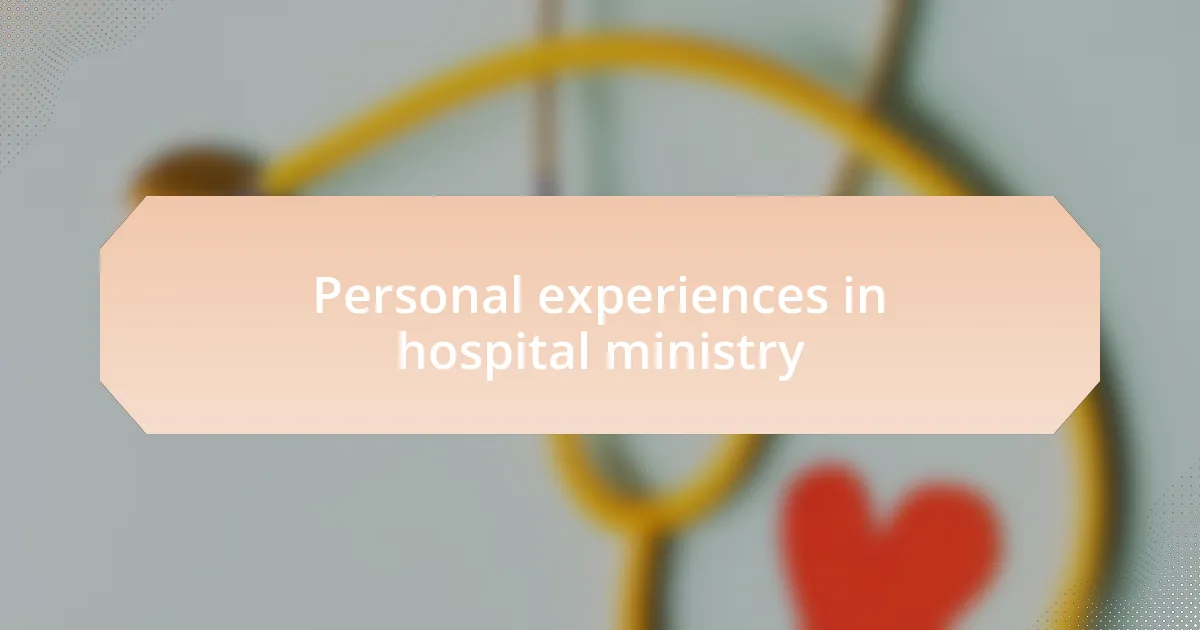
Personal experiences in hospital ministry
In my time in hospital ministry, I often find myself reflecting on the significance of presence. One evening, a young mother was overwhelmed in the corner of a waiting room. I approached her softly, offering not just my ear but my heart, guiding her to express her fears and hopes. That moment reminded me how vital it is to create a safe space for someone to unravel their emotions without judgment. Have you ever noticed how vulnerability can strengthen connections?
I also learned the power of sharing personal stories during these conversations. I once told a patient about the time I said goodbye to my own grandmother, whose spirit seemed to linger in the room long after she passed. Sharing this memory not only bridged the emotional gap but also allowed the patient to open up about their own experiences. Has sharing your own story ever helped someone feel less isolated?
Sometimes, it’s the simplest moments that leave a lasting impact. I recall sitting in a quiet room with an elderly man, simply holding his hand as he shared tales of his youth. The atmosphere was filled with warmth, creating a bond that transcended words. How often do we forget the profound comfort that silence can bring in moments of turmoil?
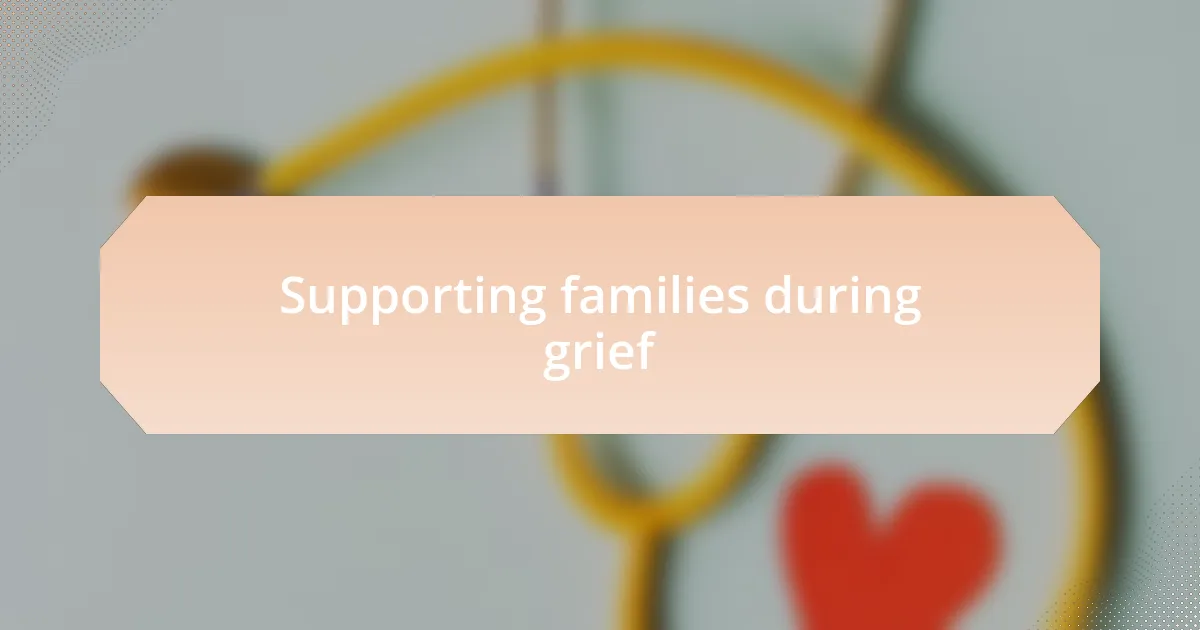
Supporting families during grief
Grief can be an isolating experience, and I’ve often seen how important it is for families to feel supported during these times. One family I worked with had just lost a beloved father, and their void felt palpable. As I sat with them, I offered a listening ear, encouraging them to share memories and stories. Have you ever noticed how reminiscing can foster a sense of connection amidst sorrow?
In another instance, I found that providing practical support was just as meaningful. I organized a simple meal for a grieving widow and her children. When I delivered it, the look of relief on her face was priceless. It struck me how small acts of kindness could alleviate some of the overwhelming stress associated with loss. Have you ever considered how these gestures profoundly speak to love and care?
It’s essential to acknowledge that everyone grieves differently. I remember a father who chose to express his sorrow through art instead of conversation. He invited me to see his paintings, each one a vivid portrayal of his emotions. Witnessing his journey through creativity reminded me of the diverse ways families can process grief. Isn’t it fascinating how art can serve as a powerful outlet for healing?